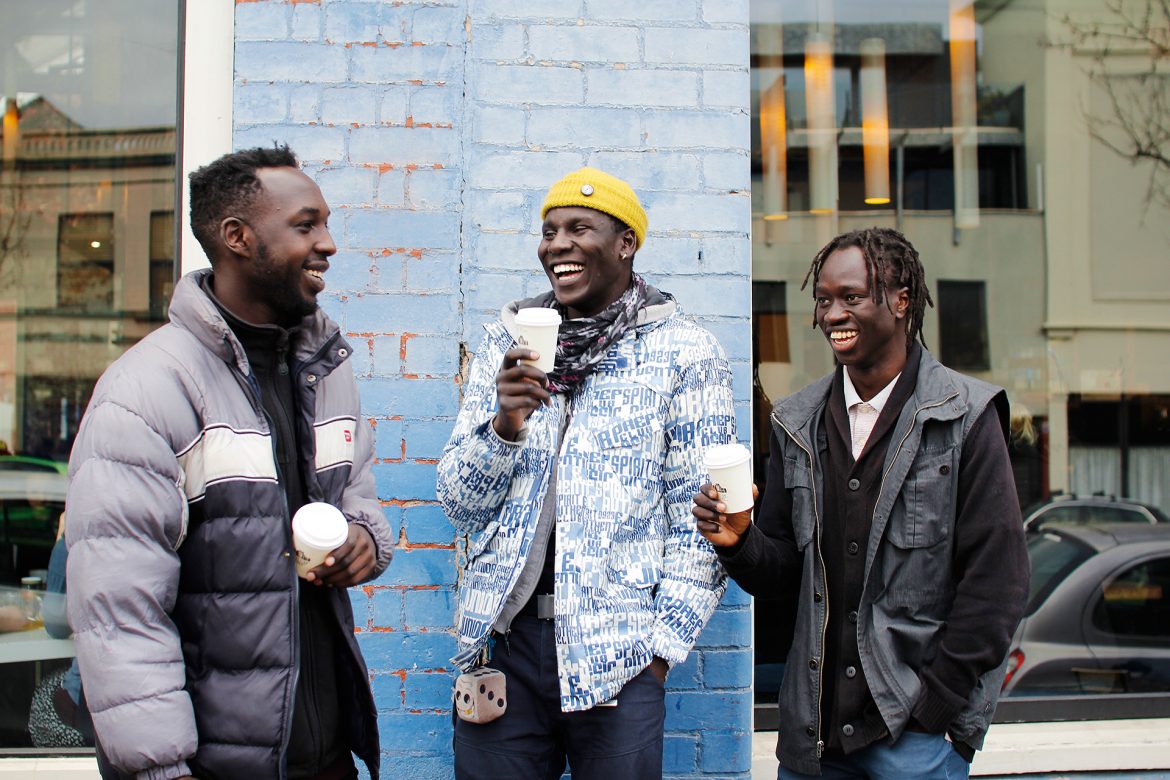
The social and political climates of every economy in our world are undergoing widespread change. Whether or not it’s realized, the laws of our lands and the commentary that comes with them affect every facet of our lives. Coffee isn’t immune to this—as a global industry, it depends on the exploitation of black and brown farmers and international laws of trade to thrive.
We look to coffee professionals in Iran, who are currently barred from participating in SCA events and WCE competitions thanks to the Trump administration, and Guatemalans leaving coffee behind in search for a better, safer life. Not only are these examples of the close relationship coffee has with politics, but the way our media portrays these people and events often demonizes them instead of informing the general public. As a result, portions of this public sometimes feel emboldened to react in dangerous ways.
In the state of Victoria in Australia, similar things are happening. Over the last year, unfair, racist media and political persecution has heavily affected Sudanese-Australians. Apparently, Melbourne is experiencing a rise in violence due to “African gangs,” but this is a myth. The sensationalism by Australian media outlets is doing more harm to these communities than good.
In the world of coffee, stepping in to stand up for the underserved and wrongly persecuted has become a new norm. It’s an acknowledgement of the very communities that produce the fruit an entire industry is built off of. From Sprudge’s multiple national fundraisers for refugees and asylum seekers to Department of Brewology’s Filter Coffee, Not People campaign—both helped send a message in strong support of people banned at US borders.
1951 Coffee Company in Berkeley, California offers employment to refugees also. Across the world in Singapore, Bettr Barista puts its focus on at-risk youth and marginalised women within their own community.
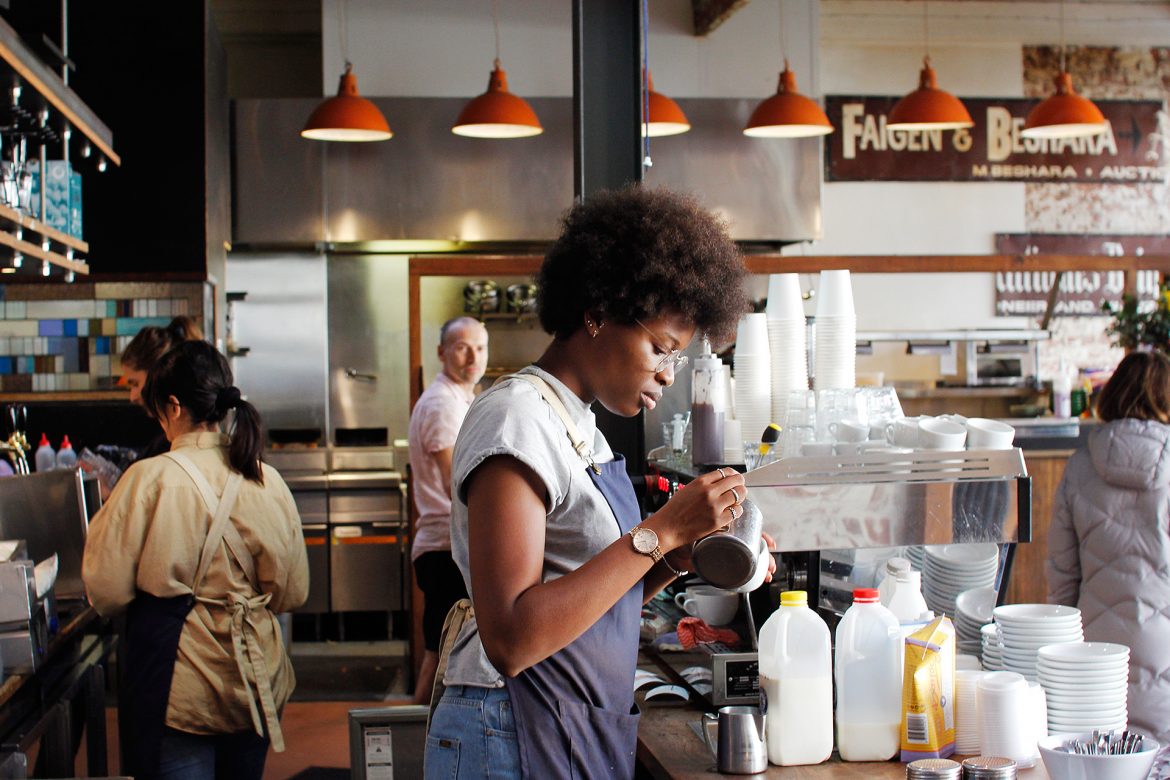
Despite the industry as a whole often toeing the line of humanitarianism and White savior complexes, it’s needless to say: the world of coffee has a heart to act for the social good of people because people are its core.
But in Melbourne—a city globally known and highly revered for its cafe culture—there rings a silence toward mobilizing for this cause in the coffee scene.
This isn’t true for every cause—there was an outpouring of community support for Australia’s vote to legalize gay marriage, and cafes have worked together nationally to raise money for the homeless. Richmond cafe Long Street Coffee also joins the list of places that employ refugees and recent migrants to Australia. Since we are in the age of coffee businesses utilizing their place in society as social third spaces to take strong stances for marginalized people everywhere, this could be an opportunity for Melbourne to join in. But as time passes, the current silence is beginning to speak volumes.
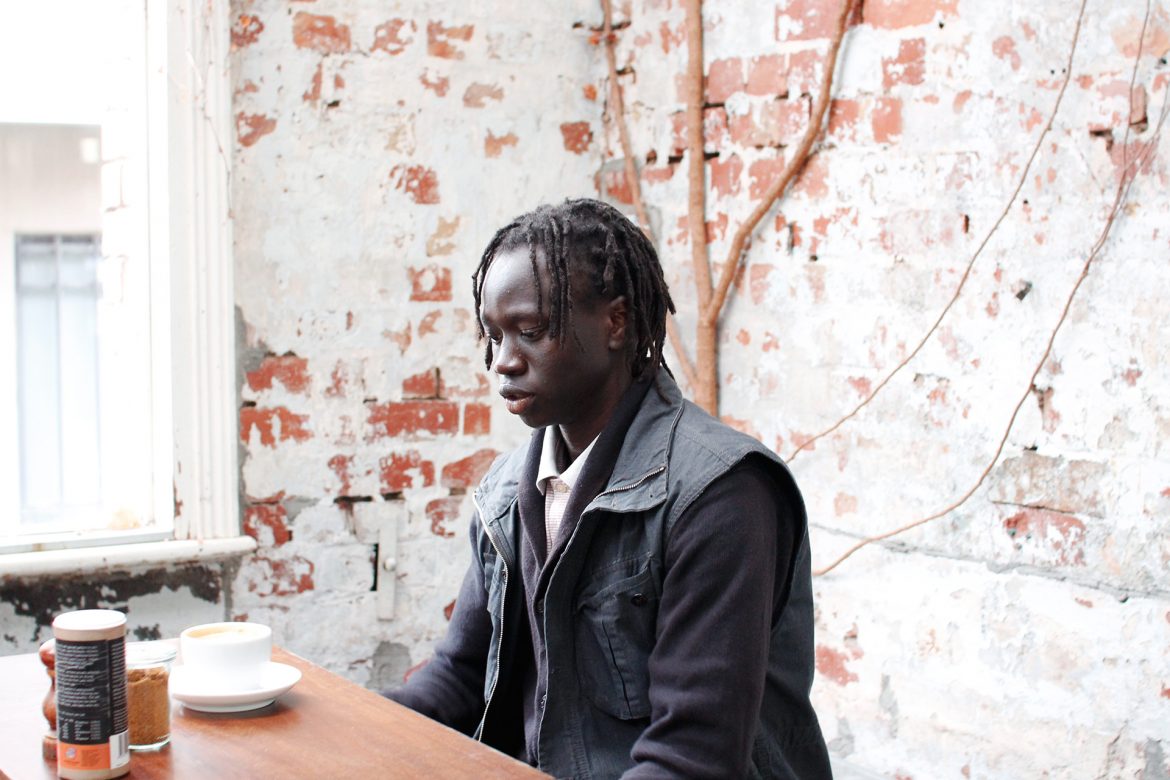
i.O.G.
In North Melbourne at Auction Rooms Cafe, three Sudanese-Australian artists—members of the collective Burn City Movement: Wantu Tha One, i.O.G, and Prince Leo—gather over coffee. They speak openly with Sprudge about their experience being seen as outsiders in a society they grew up in, and how the coffee community could play a role in fighting back against the political and media circus.
“Growing up in Australia was a wild experience,” i.O.G begins. He’s lived here almost half his life, having moved to Melbourne from South Sudan in 2006. “I grew up in the suburbs, where it was safer than most. Over the years, it’d been peaceful. But now it’s getting serious.”
I.O.G is referring to the recent rise in race-related incidents since the media’s reporting on the “African gang crisis” in the state of Victoria. This sensationalism has lingered in the media all year. Isolated incidents of South Sudanese youth committing crime have been exaggerated, so much so the Prime Minister himself spoke out against the so-called issue.
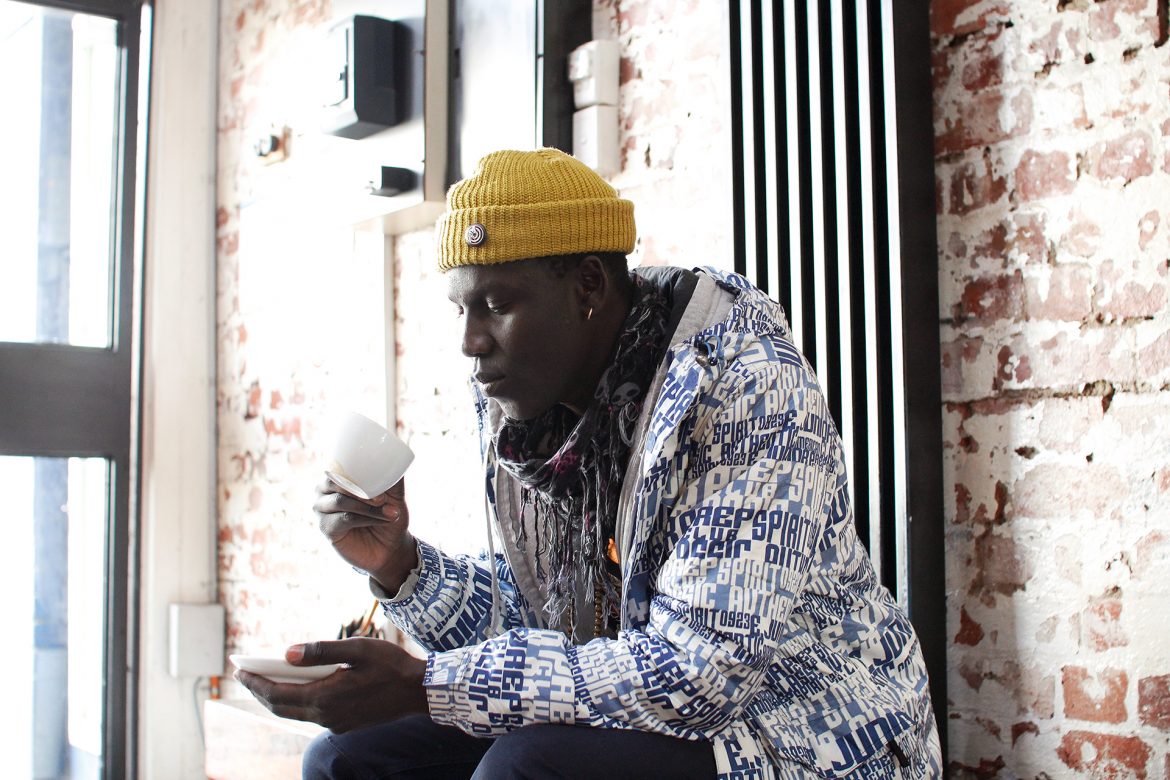
Wantu Tha One
“The Prime Minister of Australia is blurting out nonsense about African gangs and Sudanese-specific communities, while the police commissioner says this is far from a crisis; just a group of young people getting together now and again committing petty crimes,” says Wantu Tha One. “The statistics don’t add up to what they’re saying.”
And he’s right—crimes committed by Sudanese people in Victoria accounted for 1% of all crime in 2017. While many Victorians know and understand the demonization of South Sudanese people in Australia is to cause unwarranted fear for political party votes, Sudanese-Australians question why it comes at the expense of their own communities. At the same time, some are trying to find creative ways to address these problems while bringing everyone together.
This is where coffee can come in.
Wantu says, “The first thing—[Melbourne] coffee culture would have to find a way to welcome people of all backgrounds. And from there, we can feel more comfortable utilizing these spaces to come together.” Although they’re not the only black people in the cafe on this particular Sunday afternoon, they stand out. The stares from patrons of the cafe are glaringly apparent, but the vibe isn’t inherently unwelcoming.
“[Coffee shops] are more friendly in the city,” Wantu continues. “You find more open minds, and you’re greeted with a friendly smile. There are other areas where you walk into the shop and you feel out of place automatically.”
In the decades following the White Australia Policy ending in 1973, Australia promoted multiculturalism. The City of Melbourne proudly calls itself home to “one of the world’s most harmonious and culturally diverse communities,” reflected heavily in the city’s culinary spread, including coffee. But when you walk into one of the numerous cafes residents and tourists alike have to choose from, folks on both sides of the bar look mostly the same.
There’s a chance for Melbourne cafes to not only open their space to have these conversations and mobilize for the community, but offer jobs, as well. After all, being a barista is considered a serious profession in Australia—often viewed as a trade.
Certain politicians have suggested Sudanese people aren’t adjusting quickly enough to Australian culture. This is an interesting point to make considering the lack of support received overall after migration from a war-torn country to a society much different than their own. But maybe it’s here—at the coffee shop—where the lines that have clearly been drawn to divide Australians can begin to blur.
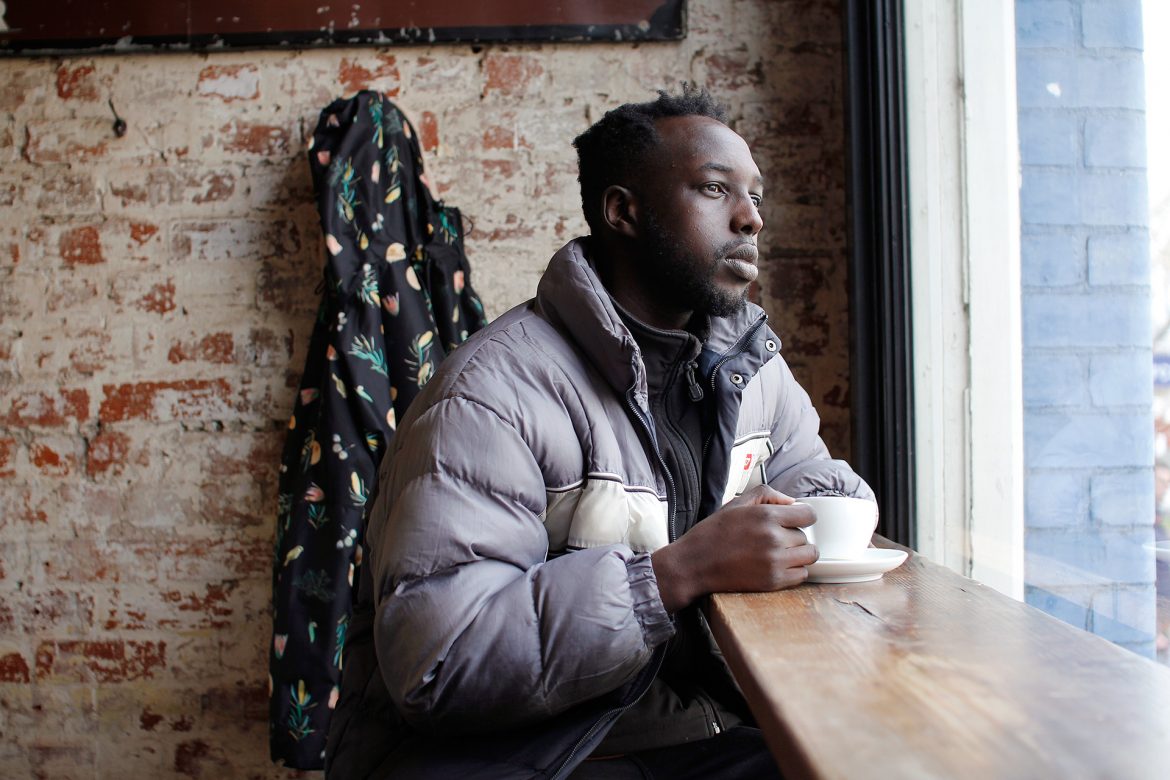
Prince Leo
Prince Leo asserts, “I don’t drink coffee on a daily basis, but I do respect the culture. Over here, it’s more than coffee. It’s social. It’s a vibe. We can use that to bring more awareness to what’s happening right now.”
The idea of spending time behind the espresso machine riles up the conversation as the group sips on cappuccinos and gazes at the baristas working. Wantu says, “Being a barista, you get to meet and connect with a lot of different people. And the idea of having coffee meet-ups to have a space for these connections could make a change.”
In a city where coffee is woven into the fabric of society, the amount of influence the coffee community has is immense. The community can take a stand for its fellow Australians and help change the narrative hurting Sudanese communities. If diversity is truly something we should champion and celebrate instead, standing by silently while certain groups of people are demonized is a step in the wrong direction.
Very recently, Victoria voted to re-elect Labor Party leader Daniel Andrews to office in the state elections. Similar to the American Democratic party, Victorians rejected “a campaign based on fear and division“ in overwhelming numbers. If this is truly the case, there’s no better time for the people of Victoria to band together and slow the ripple effects of this year’s political and media storm.
As Melbourne-based lawyer, activist, and Sudanese-Australian Nyadol Nyuon put it in the Saturday Paper:
“When the voting is done, and political careers are secured or lost, when the journalists put down their ‘pens’ and head to their families or bed, and when the publishers are onto the next story, the resultant scars from this episode of moral panic will still be carved into our lives. And they will still be there, weakening the ties that bind us into a shared identity as Victorians.”
Perhaps these ties can be strengthened again, if at the very least, over a cup of coffee.
Michelle Johnson (@thechocbarista) is the publisher of The Chocolate Barista. Read more Michelle Johnson on Sprudge.
The post In Melbourne, Debunking The African Gang “Crisis” Over Coffee appeared first on Sprudge.

